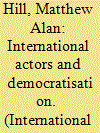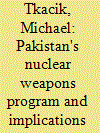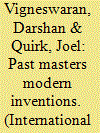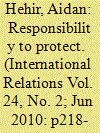|
|
|
Sort Order |
|
|
|
Items / Page
|
|
|
|
|
|
|
| Srl | Item |
| 1 |
ID:
097806


|
|
|
|
|
| Publication |
2010.
|
| Summary/Abstract |
Externally driven state-building is a complicated task that rarely fulfils the declared objectives of the international actors or the local state and society. This paper critiques the international dimension to state-building by examining USAID in Afghanistan and identifying the theoretical and practical explanations for its failure to aid democratic consolidation. Arguing that the Bush administration's democratisation efforts have had a negative impact on consolidating democracy, this paper identifies the democratic product of Afghanistan as characterised, at most, by having the formal institutions, routines and procedures of a democracy. I suggest that this merely 'formal' democratic product is too short-term and fails to take fully into account the need to develop a political and social culture capable of supporting democratic institutions. In terms of the future of democracy promotion in US foreign policy, I suggest that a change of emphasis may be occurring in the Obama administration.
|
|
|
|
|
|
|
|
|
|
|
|
|
|
|
|
| 2 |
ID:
097805


|
|
|
|
|
| Publication |
2010.
|
| Summary/Abstract |
In IR it is almost common knowledge that a strong relation exists between liberalism and the idea that trade promotes peace. This paper shows that this is based on an incomplete view of the liberal tradition. The trade-leads-to-peace hypothesis does not originate in liberalism, while some of the most important liberal thinkers, notably Smith, Hume and Locke, never predicted trade to have a positive influence on peace. The two Scots actually saw a strong relation between trade and war. This has been widely overlooked in IR, largely due to one-sided interpretations of their writings from the early nineteenth century onwards. This article seeks to improve on the disciplinary historiography, calls on IR theorists to reappraise liberalism in relation to the trade-leads-to-peace thesis, and suggests that scholars working on trade and peace follow up on a number of important insights put forward by Hume and Smith.
|
|
|
|
|
|
|
|
|
|
|
|
|
|
|
|
| 3 |
ID:
097807


|
|
|
|
|
| Publication |
2010.
|
| Summary/Abstract |
This article analyzes Pakistan's nuclear weapons program and the characteristics of the environment in which the program is nested. These characteristics include Pakistan's history of internal and external instability; nuclear saber-rattling during crises; support for Islamic terrorism in order to advance state goals; indigenous production of many elements of its nuclear forces; possession of delivery and command and control systems with destabilizing characteristics; and, finally, nuclear doctrine that appears to advocate first use of nuclear weapons. The article argues that the characteristics of Pakistan's nuclear weapons program generate threats to US national security interests. The article examines six interrelated and synergistic challenges for US national security: first, Pakistan is engaged in an arms race in Southwest Asia that has negative implications for Pakistan's stability; second, the threat of nuclear proliferation from Pakistan continues; third, Pakistan's arsenal characteristics make accidental and/or unauthorized nuclear war more likely; fourth, there is an ongoing possibility of war with India; fifth, Islamist influence is spreading through key sectors of Pakistani society; and, finally, there is an increasing danger of state failure in Pakistan.
|
|
|
|
|
|
|
|
|
|
|
|
|
|
|
|
| 4 |
ID:
097804


|
|
|
|
|
| Publication |
2010.
|
| Summary/Abstract |
In this article, we explore the relationship between past and present international relations (IR) scholarship, paying particular attention to the way in which various representations, interpretations and classifications of past works can collectively influence how modern scholars ask and answer questions. This serves two main purposes. On the one hand, we seek to contribute to a growing literature interrogating misleading and simplistic depictions of past authors and eras. On the other, we explore how the history of ideas can be utilized as a critical resource, which offers a compelling platform from which to refine and re-evaluate prevailing notions of the purposes of intellectual inquiry.
|
|
|
|
|
|
|
|
|
|
|
|
|
|
|
|
| 5 |
ID:
097808


|
|
|
|
|
| Publication |
2010.
|
| Summary/Abstract |
The term 'Responsibility to Protect' (R2P) has dominated debate on humanitarian intervention since the publication in 2001 of the report of the International Commission on Intervention and State Sovereignty (ICISS). Today 'R2P' has become a seemingly obligatory reference point for all researchers in this field and R2P's near ubiquity is testament to the effective marketing of the idea. This article will argue, however, that the currency of the term obscures its hollowness. R2P has undeniably changed the discourse surrounding humanitarian intervention, and possibly broadened interest in the subject, but it has contributed little of substance or prescriptive merit. Though the report was drafted with the mandate to reconcile international human rights with state sovereignty it fudged the key issues, namely, substantive reform of the United Nations Security Council, the legitimacy of unilateral humanitarian intervention and the threshold for intervention. The shift in focus from response to prevention since 2001 evades the key issue which prompted the ICISS to draft its report and fails to provide a viable or innovative approach.
|
|
|
|
|
|
|
|
|
|
|
|
|
|
|
|
|
|
|
|
|